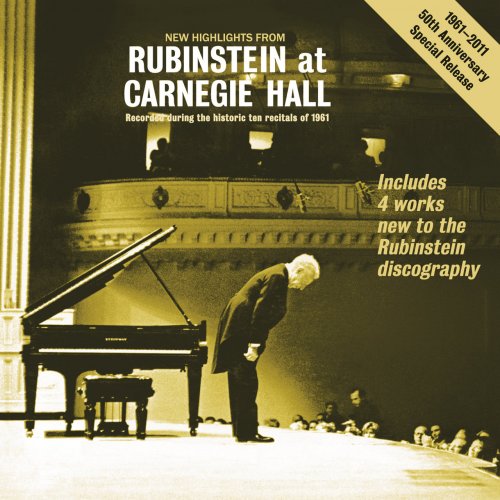Arthur Rubinstein - New Highlights From "Rubinstein At Carnegie Hall" - Recorded During The Historic 10 Recitals Of 1961 (2016) [Hi-Res]

Artist: Arthur Rubinstein
Title: New Highlights From "Rubinstein At Carnegie Hall" - Recorded During The Historic 10 Recitals Of 1961
Year Of Release: 2016
Label: RCA Red Seal
Genre: Classical
Quality: FLAC (tracks) [44.1kHz/24bit]
Total Time: 3:42:43
Total Size: 2.09 GB
WebSite: Album Preview
Tracklist:Title: New Highlights From "Rubinstein At Carnegie Hall" - Recorded During The Historic 10 Recitals Of 1961
Year Of Release: 2016
Label: RCA Red Seal
Genre: Classical
Quality: FLAC (tracks) [44.1kHz/24bit]
Total Time: 3:42:43
Total Size: 2.09 GB
WebSite: Album Preview
01 L'Isle joyeuse
02 La plus que lente
03 No. 8 Ondine from Preludes, Book II
04 Triana
05 No. 11 Dance of Terror from El amour brujo
06 Dance of the Miller's wife from The Three-Cornered Hat
07 The Maiden and the Nightingale
08 No. 7 Funerailles from Harmonies Poetique et Religieuses
09 Valse oubliée, No. 1
10 Hungarian Rhapsody No. 12 in C-Sharp Minor, S. 244 / 12
11 Nocturne for the Left-hand alone in D-flat, Op. 9, No. 2
12 Russian Dance
13 Petrouchka's Cell
14 The Shrove-tide Fair
15 Chaconne from Partita No. 2 in D Minor, BWV 1004 for Solo Violin
16 Allegro maestoso
17 Andante espressivo
18 Scherzo: Allegro energico
19 Intermezzo: Andante molto
20 Finale: Allegro moderato ma rubato
21 Intermezzo, Op. 117, No. 2 in B-Flat Minor
22 Intermezzo Op. 118, No. 2, in A
23 Intermezzo Op. 118, No. 6 in E-Flat Minor
24 Mazurka in D, Op. 33, No. 2
25 Nocturne No. 8 in D-Flat Major, Op. 27, No. 2
26 Impromptu No. 4 in A-flat, D. 899, Op. 90, No. 4
27 I. Grave
28 II. Scherzo
29 III. Marche funèbre
30 IV. Finale - Presto
31 Prelude No. 4 in E Minor, Op. 28, No. 4
32 Prelude No. 8 in F-Sharp Minor, Op. 28, No. 8
33 Prelude No. 15 in D-Flat Major, Op. 28, No. 15 Raindrop
34 Prelude No. 21 in B-Flat Major, Op. 28, No. 21
35 Prelude No. 23 in F Major, Op. 28, No. 23
36 Prelude No. 24 in D Minor, Op. 28, No. 24
37 Berceuse in D-Flat Major, Op. 57
38 Polonaise-Fantasie in A-Flat Major, Op. 61
39 Fantasie-lmpromptu in C-Sharp Minor, Op. 66
40 Etude No. 14 in F Minor, Op. 25, No. 2
41 Etude No. 15 in F Major, Op. 25, No. 3
42 Etude No. 12 in C Minor, Op. 10, No. 12 ''Revolutionary''
43 Polonaise No. 6 in A-Flat Major, Op. 53 ''Heroic''
Warm, lyrical, and aristocratic in his interpretations, Artur Rubinstein performed impressively into extremely old age, and he was a keyboard prodigy almost from the time he could climb onto a piano bench. He came from a mercantile rather than a musical family, but fixated on the piano as soon as he heard it. At age three he impressed Joseph Joachim, and by the age of seven he was playing Mozart, Schubert, and Mendelssohn at a charity concert in his hometown. In Warsaw, he had piano lessons with Alexander Róóycki; then in 1897 he was sent to Berlin to study piano with Heinrich Barth and theory with Robert Kahn and Max Bruch, all under Joachim's general supervision. In 1899 came his first notable concerto appearance in Potsdam. Soon thereafter, just barely a teenager, he began touring Germany and Poland.
After brief studies with Paderewski in Switzerland in 1903, Rubinstein moved to Paris, where he met Ravel, Dukas, and Jacques Thibaud, and played Saint-Saëns' G minor concerto to the composer's approval. That work would remain a flashy Rubinstein vehicle for six decades, and it was the concerto he offered in his American debut with the Philadelphia Orchestra in New York's Carnegie Hall in 1906. His under-prepared American tour was not especially well-received, though, so he withdrew to Europe for further study. Rubinstein became an adept and sensitive chamber musician and accompanist; his 1912 London debut was accompanying Pablo Casals, and during World War I he toured with Eugène Ysaÿe.
He gave several successful recitals in Spain during the 1916-1917 season, and soon toured Latin America. Along the way he developed a great flair for Hispanic music; Heitor Villa-Lobos went so far as to dedicate to Rubinstein his Rudepoêma, one of the toughest works in the repertory. Although Rubinstein would later be somewhat typecast as a Chopin authority, his readings of Falla, Granados, and Albéniz would always be equally idiomatic.
Rubinstein's international reputation grew quickly, although he was by his own account a sloppy technician. In the mid-1930s he withdrew again and drilled himself in technique. By 1937 he reemerged as a musician of great discipline, poise, and polish -- qualities he would mostly retain until his farewell recital in London in 1976, at the age of 89. Rubinstein's temperament had sufficient fire for Beethoven but enough poetry for Chopin; his tempos and dynamics were always flexible, but never distorted. His 1960s recordings for RCA of nearly all Chopin's solo piano music have been considered basic to any record collection since their release, and his version of Falla's Nights in the Gardens of Spain is another classic, as are his various late collaborations with the Guarneri Quartet.
Rubinstein became a naturalized American citizen in 1946, but he maintained residences in California, New York, Paris, and Geneva; two of his children were born in the United States, one in Warsaw, and one in Buenos Aires. He had married Aniela Mlynarska in 1932, but womanizing remained integral to his reputation as an irrepressible bon vivant. He maintained that the slogan "wine, women, and song" as applied to him meant 80 percent women and only 20 percent wine and song.
Still, there was a serious side to his life. After World War II, he refused ever again to perform in Germany, in response to the Nazi extermination of his Polish family. Rubinstein became a strong supporter of Israel; in gratitude, an international piano competition in his name was instituted in Jerusalem in 1974. His honors included the Gold Medal of the Royal Philharmonic Society of London, the U.S. Medal of Freedom (1976), and membership in the French Legion of Honor. ~ James Reel
After brief studies with Paderewski in Switzerland in 1903, Rubinstein moved to Paris, where he met Ravel, Dukas, and Jacques Thibaud, and played Saint-Saëns' G minor concerto to the composer's approval. That work would remain a flashy Rubinstein vehicle for six decades, and it was the concerto he offered in his American debut with the Philadelphia Orchestra in New York's Carnegie Hall in 1906. His under-prepared American tour was not especially well-received, though, so he withdrew to Europe for further study. Rubinstein became an adept and sensitive chamber musician and accompanist; his 1912 London debut was accompanying Pablo Casals, and during World War I he toured with Eugène Ysaÿe.
He gave several successful recitals in Spain during the 1916-1917 season, and soon toured Latin America. Along the way he developed a great flair for Hispanic music; Heitor Villa-Lobos went so far as to dedicate to Rubinstein his Rudepoêma, one of the toughest works in the repertory. Although Rubinstein would later be somewhat typecast as a Chopin authority, his readings of Falla, Granados, and Albéniz would always be equally idiomatic.
Rubinstein's international reputation grew quickly, although he was by his own account a sloppy technician. In the mid-1930s he withdrew again and drilled himself in technique. By 1937 he reemerged as a musician of great discipline, poise, and polish -- qualities he would mostly retain until his farewell recital in London in 1976, at the age of 89. Rubinstein's temperament had sufficient fire for Beethoven but enough poetry for Chopin; his tempos and dynamics were always flexible, but never distorted. His 1960s recordings for RCA of nearly all Chopin's solo piano music have been considered basic to any record collection since their release, and his version of Falla's Nights in the Gardens of Spain is another classic, as are his various late collaborations with the Guarneri Quartet.
Rubinstein became a naturalized American citizen in 1946, but he maintained residences in California, New York, Paris, and Geneva; two of his children were born in the United States, one in Warsaw, and one in Buenos Aires. He had married Aniela Mlynarska in 1932, but womanizing remained integral to his reputation as an irrepressible bon vivant. He maintained that the slogan "wine, women, and song" as applied to him meant 80 percent women and only 20 percent wine and song.
Still, there was a serious side to his life. After World War II, he refused ever again to perform in Germany, in response to the Nazi extermination of his Polish family. Rubinstein became a strong supporter of Israel; in gratitude, an international piano competition in his name was instituted in Jerusalem in 1974. His honors included the Gold Medal of the Royal Philharmonic Society of London, the U.S. Medal of Freedom (1976), and membership in the French Legion of Honor. ~ James Reel
![Charles Owens Trio - 10 Years (Anniversary Edition) (2026) [Hi-Res] Charles Owens Trio - 10 Years (Anniversary Edition) (2026) [Hi-Res]](https://www.dibpic.com/uploads/posts/2026-02/1770942375_qq3q442wai8jz_600.jpg)


![Charles Mingus - Mingus Ah Um (1959) [2022 DSD256] Charles Mingus - Mingus Ah Um (1959) [2022 DSD256]](https://www.dibpic.com/uploads/posts/2026-02/1770882753_folder.jpg)
![Kurt Elling & WDR Big Band - In The Brass Palace (2026) [Hi-Res] Kurt Elling & WDR Big Band - In The Brass Palace (2026) [Hi-Res]](https://www.dibpic.com/uploads/posts/2026-02/1770798163_ap5aqf18jvswb_600.jpg)
![John Coltrane - "Live" At The Village Vanguard (1962) [2022 DSD256] John Coltrane - "Live" At The Village Vanguard (1962) [2022 DSD256]](https://www.dibpic.com/uploads/posts/2026-02/1770880537_folder.jpg)


